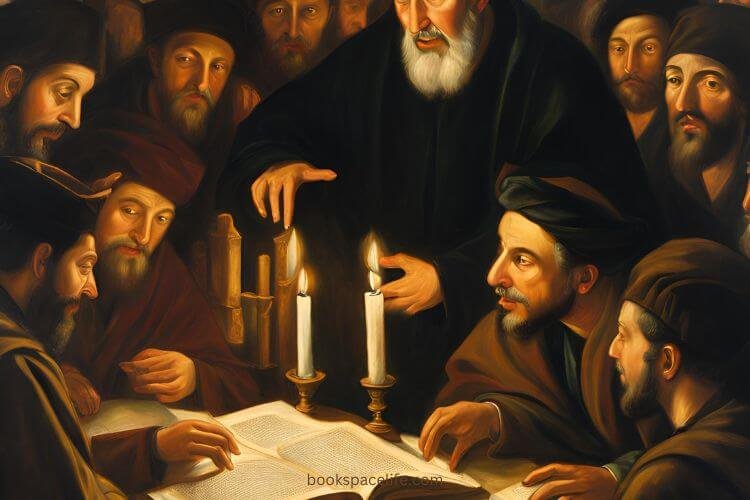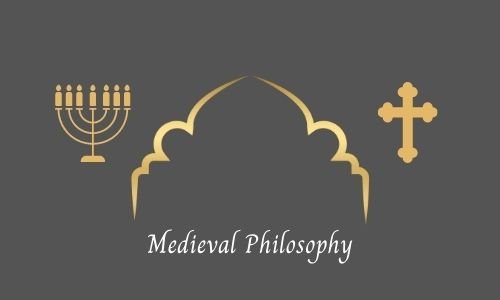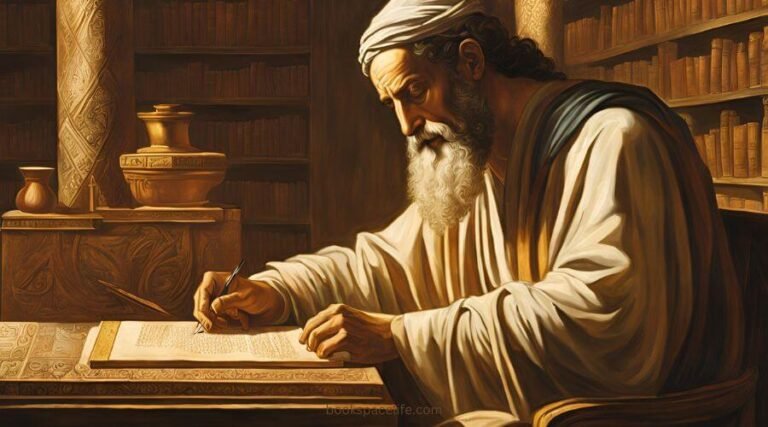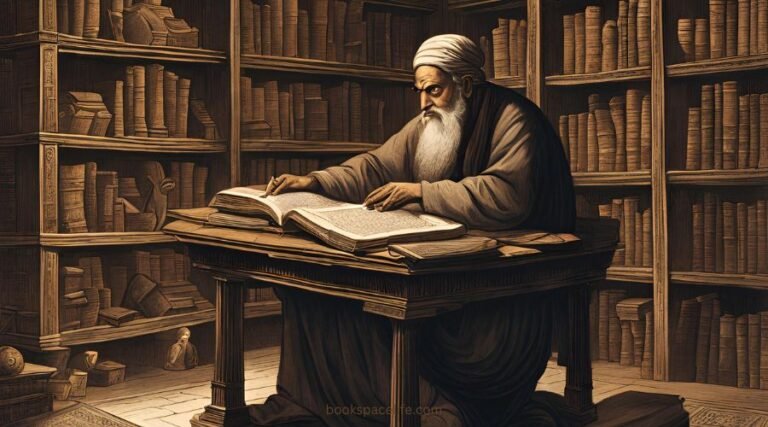Medieval Philosophy
Table of Contents
Bridging Ancient Thought and Modern Understanding
Medieval philosophy represents a rich and transformative period in the history of Western thought, spanning roughly from the fall of the Roman Empire in the 5th century to the Renaissance in the 15th century.
This era was marked by the integration of ancient philosophical traditions, particularly those of Plato and Aristotle, with religious doctrines, predominantly Christianity, but also Judaism and Islam.
The period was characterized by significant developments in metaphysics, ethics, epistemology, and political philosophy.
This blog post explores the key figures, themes, and lasting impact of medieval philosophy, illuminating its role in shaping the intellectual landscape of the Western world.

(1) Historical Context of Medieval Philosophy
The medieval period, often referred to as the Middle Ages, was a time of great social, political, and religious upheaval.
Following the collapse of the Roman Empire, Europe entered a phase often described as the Dark Ages, marked by a decline in urban life and classical learning.
However, the establishment of monastic schools and the rise of universities in the later medieval period contributed to a revival of learning.
Medieval philosophy is often divided into three main phases:
- Early Medieval Philosophy (5th to 10th century): This period saw the rise of Christian philosophers who sought to reconcile ancient philosophical thought with Christian theology. Key figures include Augustine of Hippo and Boethius.
- High Medieval Philosophy (11th to 13th century): The Scholastic movement emerged during this period, characterized by the rigorous analysis of texts and the synthesis of Aristotelian philosophy with Christian doctrine. Prominent thinkers include Anselm of Canterbury, Thomas Aquinas, and Duns Scotus.
- Late Medieval Philosophy (14th to 15th century): This phase saw the decline of Scholasticism and the rise of humanism, leading to a renewed focus on classical texts and individual thought. Key figures include William of Ockham and Nicholas of Cusa.
(2) Key Figures and Themes in Medieval Philosophy
1) Augustine of Hippo (354-430)
St. Augustine is one of the most influential philosophers of the early medieval period. His works, particularly “Confessions” and “The City of God,” explore the nature of God, the human soul, and the relationship between faith and reason.
Augustine emphasized the importance of divine revelation and the necessity of grace for salvation.
- Key Ideas: Augustine argued that truth is found in God, and human reason is limited. He introduced the concept of the “City of God,” contrasting the earthly city, characterized by sin, with the heavenly city, representing divine justice and eternal life.
2) Boethius (c. 480-524)
Boethius, a Roman philosopher, is best known for his work “Consolation of Philosophy,” written during his imprisonment.
This text blends Platonic philosophy with Christian theology, exploring themes of fortune, happiness, and the nature of God.
- Key Ideas: Boethius argued that true happiness comes from within and is not dependent on external circumstances. He introduced the idea of the eternal and immutable nature of God, laying the groundwork for later discussions on divine foreknowledge and human free will.
3) Anselm of Canterbury (1033-1109)
Anselm is often referred to as the father of Scholasticism. He is known for his ontological argument for the existence of God, which posits that the very concept of a perfect being implies its existence.
- Key Ideas: Anselm’s works, including “Proslogion,” argue that faith and reason are complementary. He emphasized that understanding the divine nature requires rational inquiry, and his ideas influenced later medieval thinkers, particularly Aquinas.
4) Thomas Aquinas (1225-1274)
Thomas Aquinas is perhaps the most significant figure in medieval philosophy. His magnum opus, “Summa Theologica,” is a comprehensive synthesis of Aristotelian philosophy and Christian theology.
Aquinas aimed to demonstrate the harmony between faith and reason, addressing fundamental questions about existence, morality, and the nature of God.
- Key Ideas: Aquinas is known for his Five Ways, which are arguments for the existence of God based on observation of the natural world. He distinguished between natural law and divine law, emphasizing that human beings can discern moral truths through reason. His emphasis on the importance of virtues and the common good has had a lasting influence on ethics and political philosophy.
5) Duns Scotus (c. 1266-1308)
Duns Scotus was a significant figure in high medieval philosophy, known for his nuanced views on metaphysics and theology. He introduced the concept of “univocity of being,” arguing that existence is a fundamental property shared by all entities.
- Key Ideas: Scotus emphasized the importance of individual essence and the uniqueness of each being. His ideas on free will and the Immaculate Conception of Mary were influential in the development of later theological thought.
6) William of Ockham (c. 1287-1347)
Ockham is best known for Ockham’s Razor, a principle that suggests one should not multiply entities beyond necessity. He emphasized the importance of empirical evidence and the limits of human reason.
- Key Ideas: Ockham’s critique of Scholasticism led to a shift towards nominalism, which denied the existence of universal forms outside individual objects. His work influenced the development of modern philosophy, particularly in discussions about metaphysics and epistemology.
7) Nicholas of Cusa (1401-1464)
Nicholas of Cusa is often regarded as a precursor to the Renaissance, bridging medieval thought and early modern philosophy. He emphasized the importance of mysticism and the limits of human understanding.
- Key Ideas: Cusa introduced the concept of “docta ignorantia” or “learned ignorance,” suggesting that true knowledge involves recognizing the limits of human understanding. His works explored the relationship between God and the universe, paving the way for later philosophical and scientific developments.
(3) Major Themes in Medieval Philosophy
1) Faith and Reason
A central theme in medieval philosophy is the relationship between faith and reason. Thinkers like Augustine and Aquinas sought to demonstrate that faith and reason are not in conflict but can complement one another. This dialogue between faith and reason laid the groundwork for later theological and philosophical developments, influencing the Reformation and the Enlightenment.
2) The Nature of God
Medieval philosophers engaged in profound discussions about the nature of God, exploring attributes such as omnipotence, omniscience, and benevolence. The question of divine foreknowledge and human free will was a significant point of contention, particularly in the works of Augustine and Aquinas.
3) Ethics and Morality
The exploration of ethics and morality in medieval philosophy often centered on the idea of natural law.
Thinkers like Aquinas argued that moral principles are grounded in human nature and can be discerned through reason. This focus on natural law influenced later ethical theories and legal frameworks.
4) Metaphysics and Ontology
Medieval philosophy witnessed significant developments in metaphysics, particularly concerning the nature of existence and being.
The distinction between essence and existence, as discussed by Scotus and Aquinas, had lasting implications for metaphysical thought in the subsequent centuries.
5) Political Philosophy
Medieval philosophers also contributed to discussions on political philosophy, particularly regarding the nature of authority and the role of the state.
Aquinas’s ideas on just governance and the common good influenced later political theories and concepts of justice.
(4) The Influence of Medieval Philosophy
The impact of medieval philosophy is profound and enduring, shaping the trajectory of Western thought in several ways:
- Integration of Faith and Reason: The medieval synthesis of faith and reason set the stage for later philosophical movements, including the Renaissance and the Enlightenment. The emphasis on rational inquiry and the pursuit of knowledge continued to resonate throughout history.
- Development of Universities: The medieval period saw the establishment of universities, which became centers of learning and debate. The curriculum often included philosophy, theology, and the liberal arts, laying the foundation for modern higher education.
- Influence on Modern Philosophy: Medieval thinkers, particularly Aquinas and Ockham, influenced subsequent philosophers such as Descartes, Spinoza, and Kant. The debates over metaphysics, ethics, and epistemology continued to shape philosophical discourse well into the modern era.
- Ethical Theories: The exploration of ethics during the medieval period laid the groundwork for contemporary ethical theories. The concepts of virtue, natural law, and moral reasoning continue to be central themes in modern moral philosophy.
- Interfaith Dialogue: The medieval period witnessed significant interactions between Christian, Jewish, and Islamic philosophers. Thinkers such as Maimonides and Averroes contributed to a rich dialogue that fostered mutual understanding and influenced the development of philosophical thought across cultures.
(5) Conclusion
Medieval philosophy stands as a testament to the enduring quest for knowledge and understanding. This period, characterized by the synthesis of ancient thought and religious doctrine, laid the groundwork for many of the ideas that continue to shape contemporary philosophy, ethics, and theology.
The contributions of key figures such as Augustine, Aquinas, and Ockham have left a lasting legacy, influencing not only the development of Western thought but also fostering dialogues across different cultural and religious traditions.
As we engage with the questions raised by medieval philosophers, we are reminded of the complexity and richness of human thought, as well as the ongoing search for truth and understanding that defines our intellectual heritage.
In an age marked by rapid change and uncertainty, the insights of medieval philosophy invite us to reflect on the relationship between faith and reason, the nature of existence, and the pursuit of the good life, encouraging us to continue the timeless dialogue that began in the shadow of the ancient world and continues to resonate in our modern lives.Top of Form








